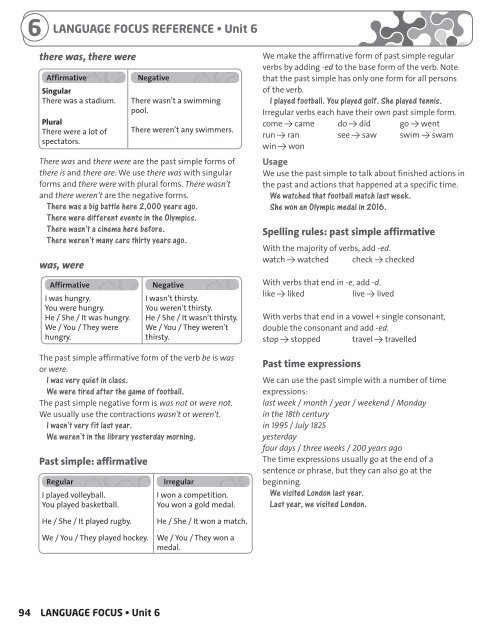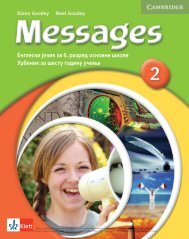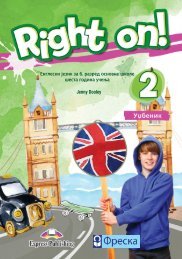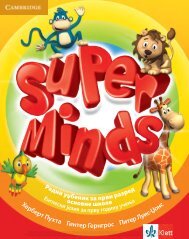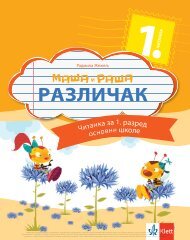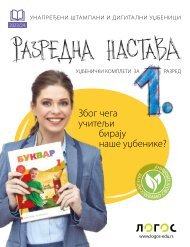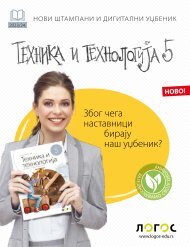Нови Логос, Еnglish plus 1, radna sveska
- No tags were found...
You also want an ePaper? Increase the reach of your titles
YUMPU automatically turns print PDFs into web optimized ePapers that Google loves.
6<br />
LANGUAGE FOCUS REFERENCE • Unit 6<br />
there was, there were<br />
Affirmative<br />
Singular<br />
There was a stadium.<br />
Plural<br />
There were a lot of<br />
spectators.<br />
There was and there were are the past simple forms of<br />
there is and there are. We use there was with singular<br />
forms and there were with plural forms. There wasn’t<br />
and there weren’t are the negative forms.<br />
There was a big battle here 2,000 years ago.<br />
There were different events in the Olympics.<br />
There wasn’t a cinema here before.<br />
There weren’t many cars thirty years ago.<br />
was, were<br />
Affirmative<br />
I was hungry.<br />
You were hungry.<br />
He / She / It was hungry.<br />
We / You / They were<br />
hungry.<br />
The past simple affirmative form of the verb be is was<br />
or were.<br />
I was very quiet in class.<br />
We were tired after the game of football.<br />
The past simple negative form is was not or were not.<br />
We usually use the contractions wasn't or weren't.<br />
I wasn’t very fit last year.<br />
We weren’t in the library yesterday morning.<br />
Past simple: affirmative<br />
Regular<br />
I played volleyball.<br />
You played basketball.<br />
Negative<br />
There wasn’t a swimming<br />
pool.<br />
There weren’t any swimmers.<br />
Negative<br />
I wasn’t thirsty.<br />
You weren’t thirsty.<br />
He / She / It wasn’t thirsty.<br />
We / You / They weren’t<br />
thirsty.<br />
Irregular<br />
I won a competition.<br />
You won a gold medal.<br />
We make the affirmative form of past simple regular<br />
verbs by adding -ed to the base form of the verb. Note<br />
that the past simple has only one form for all persons<br />
of the verb.<br />
I played football. You played golf. She played tennis.<br />
Irregular verbs each have their own past simple form.<br />
come → came do → did go → went<br />
run → ran see → saw swim → swam<br />
win → won<br />
Usage<br />
We use the past simple to talk about finished actions in<br />
the past and actions that happened at a specific time.<br />
We watched that football match last week.<br />
She won an Olympic medal in 2016.<br />
Spelling rules: past simple affirmative<br />
With the majority of verbs, add -ed.<br />
watch → watched check → checked<br />
With verbs that end in -e, add -d.<br />
like → liked<br />
live → lived<br />
With verbs that end in a vowel + single consonant,<br />
double the consonant and add -ed.<br />
stop → stopped travel → travelled<br />
Past time expressions<br />
We can use the past simple with a number of time<br />
expressions:<br />
last week / month / year / weekend / Monday<br />
in the 18th century<br />
in 1995 / July 1825<br />
yesterday<br />
four days / three weeks / 200 years ago<br />
The time expressions usually go at the end of a<br />
sentence or phrase, but they can also go at the<br />
beginning.<br />
We visited London last year.<br />
Last year, we visited London.<br />
He / She / It played rugby.<br />
We / You / They played hockey.<br />
He / She / It won a match.<br />
We / You / They won a<br />
medal.<br />
94 LANGUAGE FOCUS • Unit 6


